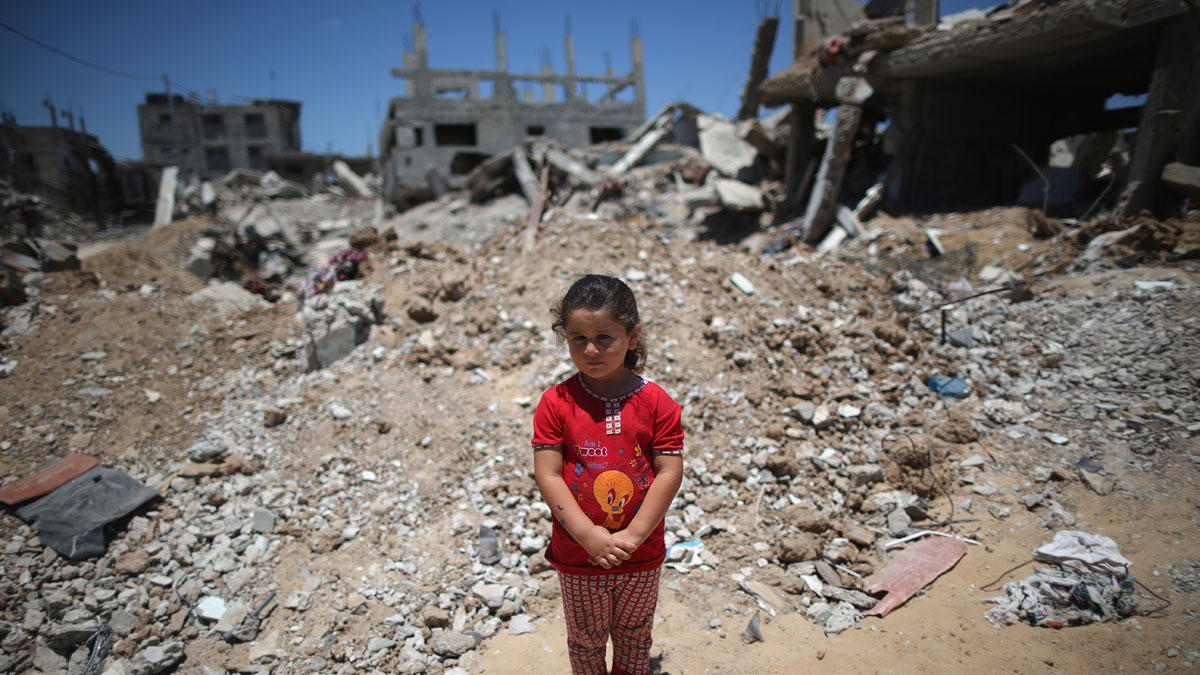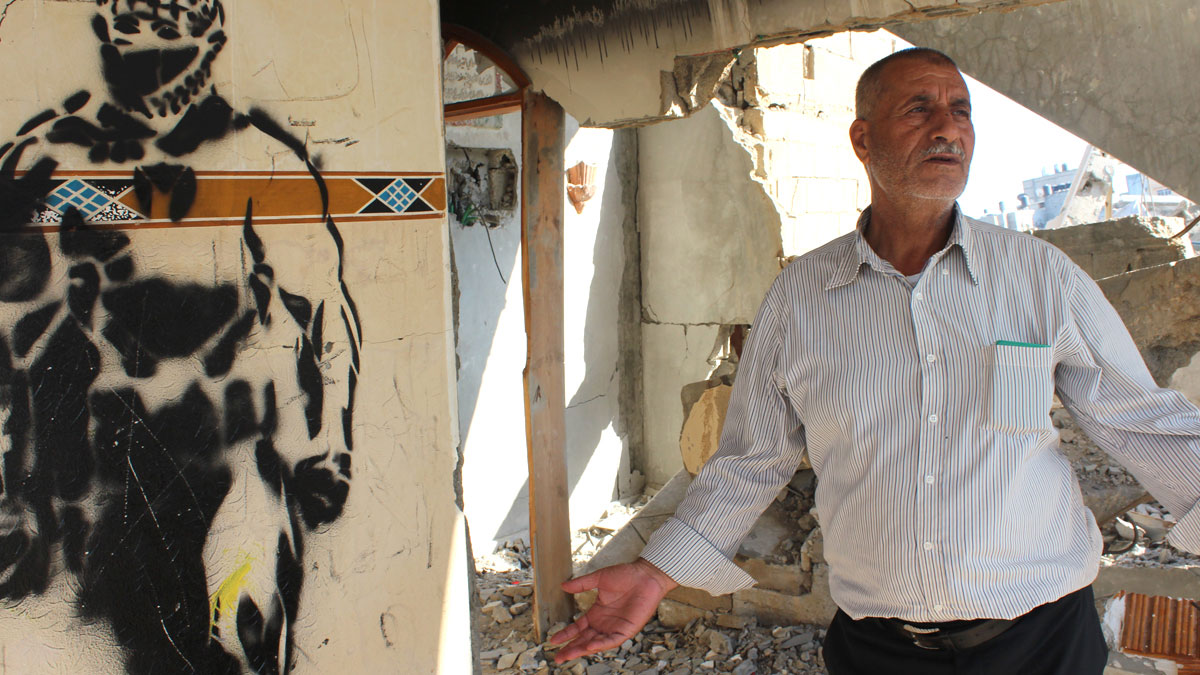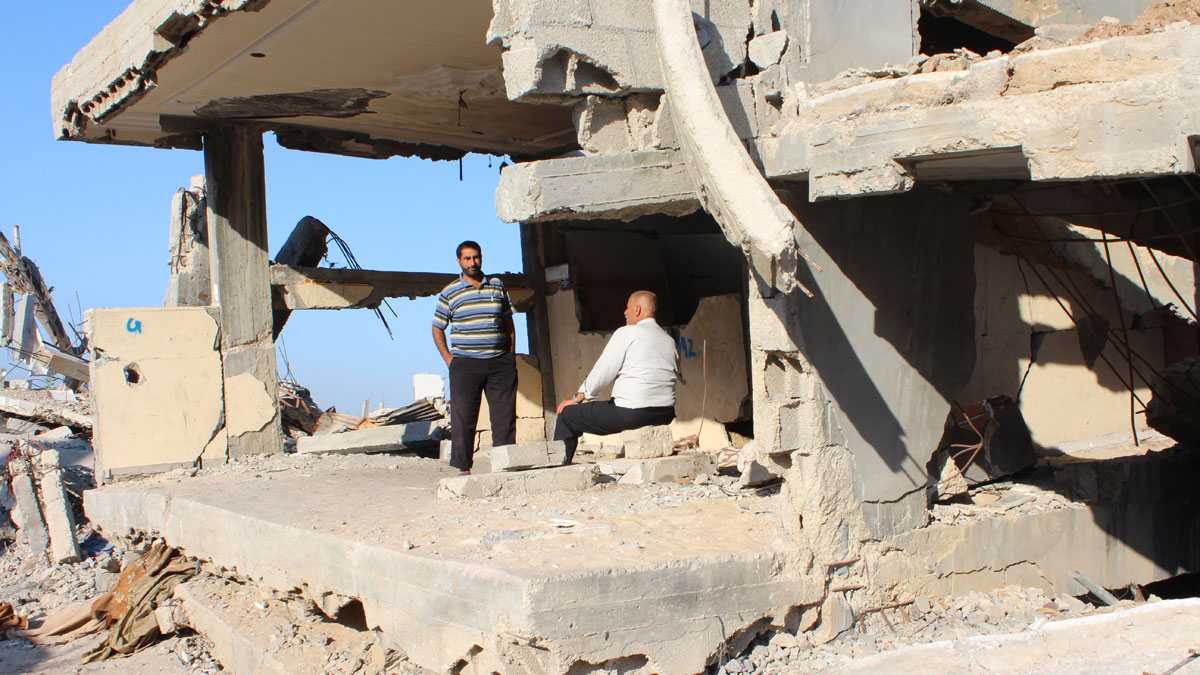Gaza conflict one year on: 'there is no future here'
A year after the war began, hope is yet to emerge from the rubble. Palestinians blame Israel, Egypt and their own weak government

A free daily email with the biggest news stories of the day – and the best features from TheWeek.com
You are now subscribed
Your newsletter sign-up was successful
By Nigel Wilson
On a hot summer afternoon, Faraj al Areer sits on a concrete slab in what used to be his living room, talking to his son Nasser.
It's an improbable domestic scene amid the devastation of the Shejiaya neighbourhood in Gaza. The buildings here, the ones that remain, are skeletal, gutted by last summer's bombs.
The Week
Escape your echo chamber. Get the facts behind the news, plus analysis from multiple perspectives.

Sign up for The Week's Free Newsletters
From our morning news briefing to a weekly Good News Newsletter, get the best of The Week delivered directly to your inbox.
From our morning news briefing to a weekly Good News Newsletter, get the best of The Week delivered directly to your inbox.
The assault on this district of Gaza City was well documented at the time, but widespread international outrage has not translated into aid for its residents. A year after Israel launched Operation Protective Edge, this neighbourhood in eastern Gaza City looks apocalyptic. A group of young men, trudging through rubble, collecting steel rods to be re-sold, is the closest thing to a clean-up operation here.
"Eight months ago, I signed an agreement at the Ministry of Public Works for them to remove the rubble and for me to take the steel bars," says Faraj. "I'm still waiting and nothing has happened. Only God knows about reconstruction."
Faraj, 65, comes here every day and sits in the remains of his home, waiting to see if anyone will come to clear away the rubble. He lived in the Shejiaya area for 50 years, surrounded by three generations of his family. "We had three houses, all were destroyed. Forty people were living in the three buildings, men, women and kids. All of them are now scattered across Gaza city, renting in different places."
A free daily email with the biggest news stories of the day – and the best features from TheWeek.com

Faraj stands next to a graffiti work by a local artist in his house that was bombed during last summer's war
Some 100,000 Palestinians were left homeless after the war last year and the number of homes damaged or destroyed reached 96,000, according to UN estimates. While some repair work on damaged properties has been completed, reconstruction of homes has yet to begin. Tens of thousands of Palestinians had taken refuge in UN buildings since the war but the final shelter, a school in Gaza City, was closed last month. The displaced have been left to rent apartments, stay with relatives or sleep in makeshift tents.
Behind the glacial pace of Gaza's reconstruction and development lies a political power struggle. Under a joint Israeli-Egyptian economic blockade, severe limitations are imposed on the materials that Gaza can import. Much needed concrete and cement have been prevented from reaching the territory, as Israel says these "dual-use" materials could serve military purposes.
The blockade, imposed by Israel in 2007 and strictly implemented by Egypt from 2013 alters the rhythm of daily life here in unexpected ways. Supermarket shelves are half-filled. Gazans recount periodic import bans on arbitrary goods, like coffee or coriander, while the high price of fish is a bewildering source of resentment for these coastal dwellers.

Faraj and his son Nasser in the living room which used to be on the third floor of their home
Down at Gaza's small port, Ahmed is arranging nets on his boat as the muezzin's evening call to prayer rings out across the bay. He has been a fisherman here for 13 years and says that current restrictions have ruined his livelihood.
"After the war, it's become more difficult," he says. "There's not enough fishing because the space we can fish is very narrow. Officially we're allowed to fish out six miles, but practically we are allowed only five miles."
Reports of Palestinian fishermen coming under attack from Israeli naval vessels are frequently documented by human rights groups. Ahmed says he has been shot at multiple times and detained twice, within the six nautical mile zone that Gazans are allowed to fish in, under the terms of the 2014 ceasefire.
"We can't even feed our family," he says. "The real fish are after six miles. If I sail more than six miles I would catch twice as much. Hamas, the PA and Israel have made this situation so difficult. We have nothing. Fishermen here aren't living, they are dead. Life is at the level of zero."
The nine-year economic blockade has been made worse by weak governance from within. An intra-Palestinian dispute between the Palestinian Authority (PA), based in the West Bank city of Ramallah, and Gaza's Hamas government, has all but stalled reconstruction and development in the coastal enclave since the war last summer.
In October 2014, international donors pledged $3.5bn (£2.2bn) for reconstruction in Gaza but as of April this year, only $900m had been distributed. The shortfall has been attributed to reluctance among donor countries to send funds to an unstable authority in Gaza, the Islamist Hamas government, preferring to deal with the moderate Palestinian Authority.
Infighting between the PA and Hamas has come at the worst possible time for Gazans struggling to rebuild their lives after the most destructive war here in modern times. On June 17, PA President Mahmoud Abbas dissolved the Palestinian national unity government, saying that Hamas had prevented it from functioning in Gaza. Hamas has rejected the move, and a new government could take weeks, more likely months, to form, leaving 1.8 million Palestinians frozen in misery, and increasingly resentful towards Hamas.
Hamdi Sersawi has imported coffee and spices into Gaza for 20 years. His factory and adjoining house were bombed during the war. His family still spend every night in their badly burnt home, which has been declared unsafe by the government. Like most Palestinians here, Hamdi has not received a single shekel in compensation.
"No one knows who will help," he says. "We've had no help from the government in Ramallah or Gaza. No one has asked about us."
Using his savings, Hamdi and his sons spent eight months repairing the factory, and his business, Bonjour Coffee, now runs at half capacity, employing 20 staff instead of the 48 before the war. "There is no market in Gaza after the war. Because of the political situation here, it's very, very hard and there is no money in the hands of the people."
"I blame the Israeli army and Hamas. What can we take from this war? Nothing. It just destroyed Gaza. There is no future in Gaza," says Hamdi, slowly repeating it three times. "There is no hope for anyone in Gaza. You can't see the light. It's all dark."
-
 ‘Poor time management isn’t just an inconvenience’
‘Poor time management isn’t just an inconvenience’Instant Opinion Opinion, comment and editorials of the day
-
 Bad Bunny’s Super Bowl: A win for unity
Bad Bunny’s Super Bowl: A win for unityFeature The global superstar's halftime show was a celebration for everyone to enjoy
-
 Book reviews: ‘Bonfire of the Murdochs’ and ‘The Typewriter and the Guillotine’
Book reviews: ‘Bonfire of the Murdochs’ and ‘The Typewriter and the Guillotine’Feature New insights into the Murdoch family’s turmoil and a renowned journalist’s time in pre-World War II Paris
-
 Epstein files topple law CEO, roil UK government
Epstein files topple law CEO, roil UK governmentSpeed Read Peter Mandelson, Britain’s former ambassador to the US, is caught up in the scandal
-
 Iran and US prepare to meet after skirmishes
Iran and US prepare to meet after skirmishesSpeed Read The incident comes amid heightened tensions in the Middle East
-
 Israel retrieves final hostage’s body from Gaza
Israel retrieves final hostage’s body from GazaSpeed Read The 24-year-old police officer was killed during the initial Hamas attack
-
 China’s Xi targets top general in growing purge
China’s Xi targets top general in growing purgeSpeed Read Zhang Youxia is being investigated over ‘grave violations’ of the law
-
 Panama and Canada are negotiating over a crucial copper mine
Panama and Canada are negotiating over a crucial copper mineIn the Spotlight Panama is set to make a final decision on the mine this summer
-
 Why Greenland’s natural resources are nearly impossible to mine
Why Greenland’s natural resources are nearly impossible to mineThe Explainer The country’s natural landscape makes the task extremely difficult
-
 Iran cuts internet as protests escalate
Iran cuts internet as protests escalateSpeed Reada Government buildings across the country have been set on fire
-
 US nabs ‘shadow’ tanker claimed by Russia
US nabs ‘shadow’ tanker claimed by RussiaSpeed Read The ship was one of two vessels seized by the US military